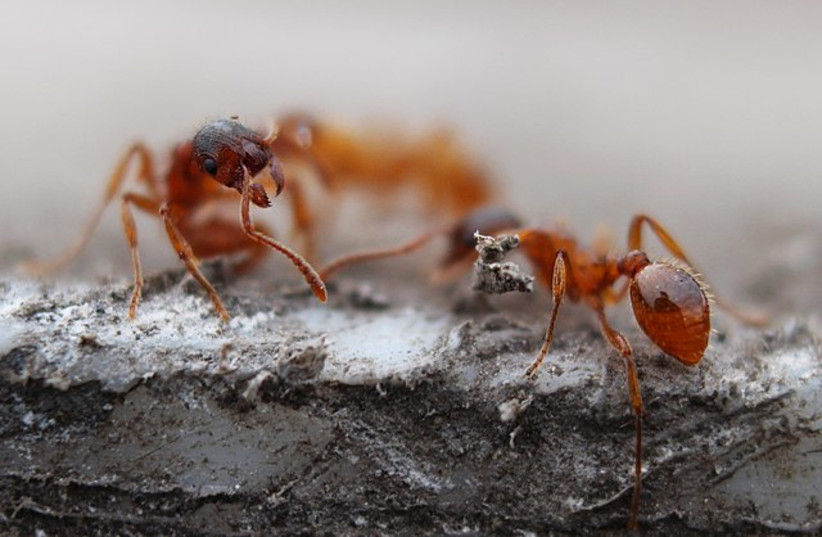Fire ants are tiny – just 1.5 millimeters long – but this invasive species from South America has spread all over Israel and is both annoying and potentially dangerous.
The Environmental Protection Ministry and the Nature and Parks Authority said on Wednesday that they have launched a national effort to monitor the presence of fire ants, Wasmannia auropunctata, from the North to the South, increase local authorities’ awareness of the pests in public areas and work to reduce infestation.
Fire ants: A painful sting to Israeli quality of life
Its painful sting causes a plummeting life quality. Parks, yards and lawns all become no-go areas. Even sofas and shower towels have to be treated with caution. It stings people, and cats and dogs may be blinded and even killed by ants that sting them in their eyes. In infested areas, the ants can cause economic damage, threatening real estate value, tourism, agricultural work and the marketing of potentially infected products. In a few years, it is estimated that the financial cost of the fire ant to the Israeli economy will be a billion shekels a year.
The ant’s amazing aggressiveness towards other species, coupled with the cooperation between different colonies due to their genetic similarity, create an ecological nightmare. Where fire ants take over, almost no arthropods (spiders and beetles) can survive, and vertebrates are also harmed.
Tel Aviv University’s Steinhardt Museum of Natural History has been running for several years a fire ant project at its entomology lab for applied ecology, and its researchers have been participating in the efforts of the ministry and the authority, Dr. Gilad Ben-Zvi, a TAU entomologist, told The Jerusalem Post. This project includes the spreading of bait that the ants take to the nests to reduce the production of eggs by the queens.

The project is being carried out in Kiryat Shmona, the Galilee Regional Council, Ma’alot, Carmiel, Haifa, Zichron Ya’acov, Rishon Lezion, Ramle, Modi’in, Ra’anana, Netanya, Tel Aviv, Ramat Hasharon, Herzliya, Mevaseret Zion, Beit Shemesh, Jerusalem, Dimona, Yeruham and Eilat.
Dr. Gal Zagron, director of the ministry’s pests division, said that in public areas where fire ants have been identified, the local authority must hire a qualified exterminator to dissolve granular bait pesticides.
Yarin Teitler, an inspector for the Nature and Parks Authority, added that for people to continue spending time at leisure and recreation sites, which include sites adjacent to moist habitats such as streams, springs and winter pools and for maintaining wildlife, it is very important to maintain the ecological systems and prevent a takeover of invasive species in general and the fire ant in particular. “Public awareness must be raised.”
The Environment and Climate Change portal is produced in cooperation with the Goldman Sonnenfeldt School of Sustainability and Climate Change at Ben-Gurion University of the Negev. The Jerusalem Post maintains all editorial decisions related to the content.
